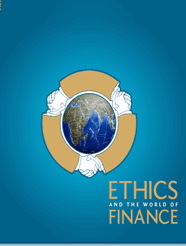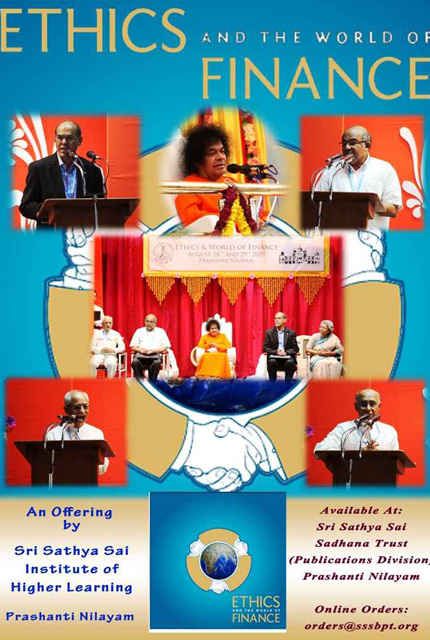ETHICS AND THE WORLD OF FINANCE
AN OVERVIEW OF THE BOOK
ETHICS AND THE WORLD OF FINANCE
This Book Review by Prof. B. L. Pandit, Former Head, Department of Economics, Delhi School of Economics and was published in the Indian Economic Review, Vol. 46, No.2, pages 363-364, December 2011 Issue.
This book is the outcome of a conference held in August 2009 when the global financial crisis had engulfed the entire world economy. The conference was organised jointly by the Department of Economics, and the School of Business Management, Sri Sathya Sai Institute of Higher Learning, Prasanthi Nilayam, Andhra Pradesh. The timing and the theme of the conference were most appropriate. On top of this, the hallowed environs of Prasanthi Nilayam provided the most suitable venue for a conference focusing on ethics in the dicey world of finance. This is because inculcation of ethics and human values is the bed rock of the system of education initiated and meticulously nurtured at this Institute. The book in its present form was released by Sri Sathya Sai Baba on the eve of the 29th Convocation of the Institute in November 2010 where Prime Minister Dr. Manmohan Singh was the Chief Guest. The conference was unique in a sense that it was a conclave of a galaxy of CEOs of banks, regulators, eminent scholars, academicians and, present and former Governor of Reserve Bank of India. Ordinarily people with such a distinguished background and diverse areas hardly converge under the aegis of a single conference. The outcome of the conference is truly outstanding.
Why is ethics important in the realm of finance? Simply, because all financial transactions are inter-temporal in nature and are based on ‘trust’. As human attributes, trust and trust worthiness cannot be enforced and have to be inculcated as part of other human values like honesty and integrity. In his message to the conference, Sri Sathya Sai Baba drew attention to parallels from Mahabharata. He observed that the values of honesty, integrity and dispassion were as important during the time of Mahabharata as these are now. Baba pointed out that while succumbing to his weakness of playing dice, Yudhishthira ignored the risks involved and after losing his kingdom in the game Dharmaraja used Draupadi as a pawn. This was done without thinking of the implicit stigma and also without consulting his brothers, as the other stakeholders .The disastrous results were there for all to see.
Dr D. Subba Rao, Governor Reserve Bank of India, in his keynote address said that when we break down the complex causes of the global crisis, several skeletons tumble out of the cupboard. Subprime borrowers were given loans at teaser rates and were led to believe that prices of houses would only rise so that borrowers would never lose. Loans were ‘sliced and diced’ and packaged as complex financial products. As was pointed out by Mr. K. R. Ramamoorthy of ING Vysa Bank, in a panel discussion, rating agencies gave unnecessarily high ratings to these complex financial products of housing portfolios. In a regime of low interest rates, pension funds, chasing higher returns, invested in these collateralized debt obligations. When interest rates increased, asset prices came crashing down and so did housing prices. This is how financial meltdown began in the US housing market which triggered the global financial crisis.
Behavior of all actors in this process was swayed by opportunities of making quick profits generated by information asymmetries. Legally things can be said to be alright. But morally it was not so. In his special address, Dr Y. V. Reddy, former Governor of RBI asks, were subprime borrowers adequately warned? Did investment advisers advise their clients about the risks? Did rating agencies compromise their standards? Financial professionals can be said to have been legally right but morally wrong. All these questions are rooted in ethics and morality. In his presentation, Professor Vishwanath Pandit, Vice-Chancellor of Sri Sathya Sai Institute of Higher Learning draws attention to how policies for trading and contracts created situations of moral hazard. Referring to Paul Krugman, Professor Pandit emphasizes that it is not that big financial institutions like AIG, Bank of America or Goldman Sachs must be cut to size but to oversee how these big financial firms are following the regulations.
A remarkable thing about this conference was the excellent quality of discourse in the panel discussions. The level of participation by the audience was exemplary and many important issues were highlighted. In one of the panel discussions Professor Pandit emphasized that good ethical education is ‘essential’ because values like trustworthiness, self-control, wisdom and sensitivity to the well-being of others cannot be imposed from outside. It is only Education in Human Values (EHV) which can inculcate such values. Shri S. V. Giri a former Vice-Chancellor and former Chief Vigilance Commissioner in his lecture elaborated on the crucial role of education in fostering human values, and the way such values are nurtured among the students at Prasanthi Nilayam. Shri Giri put emphasis on how human conduct can be regulated by controlling one’s desires. Shri K. V. Kamath, Chairman ICICI Bank highlighted the problems faced by regulators. The genesis of the crisis said Shri Kamath, was in product innovation. Regulators face the dilemma of enforcing ‘letter vs. spirit’ of regulatory laws. When regulators follow the ‘spirit’ the market participants insist on enforcing the ‘letter’ and escape several regulations. But Shri Kamath emphasized that regulators are expected to go by the ‘spirit’ behind the regulatory laws.
The message of the conference which reverberates from the pages of this book is that through values-based education, moral fiber and ethical code of a society can be strengthened. This will go a long way in shaping up public preference for need over greed and increase one’s sensitivity to other people’s welfare. At various stages during the panel discussion, the question of precisely defining the ethical code came up and several answers were attempted. As would have been expected, the three dimensional code “Daiva Preeti, Paap Bheeti, Sangha Neeti” enunciated by Sri Sathya Sai Baba overarches all definitions. Begin with love of God, combine it with fear of sin and let this be the moral code for a society.



